
-
Alphabet Inc’s Google has suspended business with Huawei that requires the transfer of hardware and software products except those covered by open source licenses, a source close to the matter told Reuters on Sunday, in a blow to the Chinese technology company that the U.S. government has sought to blacklist around the world.
Huawei Technologies Co Ltd will immediately lose access to updates to the Android operating system, and the next version of its smartphones outside of China will also lose access to popular applications and services including the Google Play Store and Gmail app.
Details of the specific services were still being discussed internally at Google, according to the source. Huawei attorneys are also studying the impact of the U.S. Commerce Department’s actions, a Huawei spokesman said on Friday. Huawei was not immediately reachable for further comment.
This means that all Google apps won't work as well as no testing and such will be performed, also expect many US applications (like all Facebook owned) to start checking your smartphone manufacturers and telling that they won't run.
US started to use their big cards, trying to stop Huawei that eats US companies at smartphones market.
Xiaomi can soon also join the company.
Both companies have their own LSI for smartphones (Xiaomi soon will show theirs), as well as special adapted version of Android that will drift far apart with time. We will soon see really big global app stores being alternative to Google Play.
-
The credibility of US suppliers will be equally at risk on foreign government contracts as well as private commercial contracts. No one will say so publicly, but this credibility or viability will be a primary weighting factor on supplier selections mid to long term. When 2 elephants fight each other, flies die, smaller nations (all) are going to get caught in between. Not that they want to, but sooner or later, they have to choose on which side of the fork to seat on.
-
Intel, Qualcomm, Xilinx and Broadcom have all said they will stop selling chips to Huawei because of Trump's executive order.
-
I used to think it did not matter who was president of the USA since the military/secret police decide everything. But this new twist on tolitarianism makes you wonder: perhaps Trump is just a Cyborg out of the CIA labs? All bets off, neither laws nor logic as we know are applicable?
With the system this overheated, and with this concentration of wealth/power, the right tick it can however make it all come crashing down very quickly.
-
I used to think it did not matter who was president of the USA since the military/secret police decide everything.
First part is true, but second part is all reverse. Both president and military act on interests of ruling class.
If it'll be necessary for Intel, Apple and others interests to kill tens of millions of people - they will go for it, and all media will cover how nice option it is.
Remember?
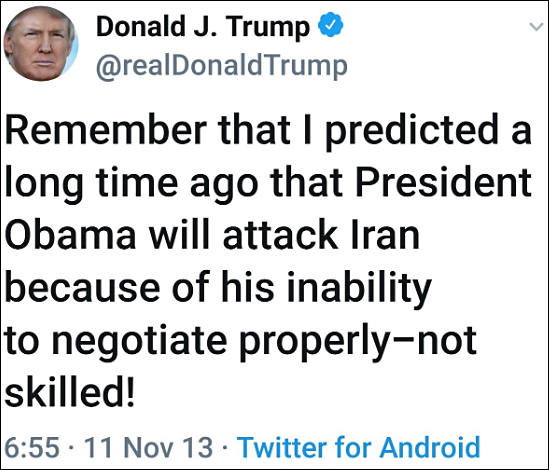
Actually, nothing changed.

 sa8357.jpg549 x 470 - 50K
sa8357.jpg549 x 470 - 50K -
What the other side might be subjected to by way of misinformation and cultural bias. (These ideas are not my own!) The website is in Indonesian, (mercifully) Unless you speak Bahasa, you'll need to disable your browser's javascript so as to copy the text and then paste it into Google Translate. https://www.thepatriots.asia/huawei-5-eyes-vs-5g/
Here's Google Translate's second half of the site's text. (When they say, "peek" they probably mean "Spy on"...
In the Cold War era, the main enemy of Five Eyes was communist countries. Today, Five Eyes collaborates to counter new threats such as the so-called "Islamist threat" and now, the "Chinese threat".
So all the rumors about Huawei's threats need to be seen through the "power struggle" between Anglo-American hegemony and China which is challenging the hegemony. The US really wants to stop China from reaching the "technological edge" over it. Whether China made a peek or not, that's not important.
But the UK has a long-lasting self-interest. He invites people to enter the War of the Spanish Succession (1701-1714), his last-last withdrawal. He promised the Jews all sorts, lastly he washed hands in Palestine. He who is willing to enter the EU, his last-last became the first to withdraw. That's why the UK was able to be the title of "perfidious albion" (treacherous Englishman - a treacherous Englishman).
For the war against Huawei this time, the UK once again rocked and left teammates. The UK decision may change Canada, Australia and New Zealand. Especially New Zealand. The economy is dependent on China (25% exports dependent on China), but also to the Five Eyes to block Huawei. So now New Zealand is experiencing economic pressure from China, the number of tourists has dropped. So now New Zealand's PM has u-turn Huawei article, there is room to negotiate.
And it may be that Trump's only survive so lone ranger to Huawei. European countries like Germany are in a dilemma whether to follow US finger tips, or to adopt Huawei technology from China. But look at the current situation, it may be wise to choose Huawei.
But I have the theory that all the sabotage to Huawei is actually a movie between Trump and Xi Jinping. You see Xi relaxed not saying anything about Huawei. It is possible Xi wants to borrow Trump's hand to pry Huawei, a crony to Jiang, a former president still influencing Chinese politics through his clan, Shanghai Clique.
Anyway, the Huawei 5G's issue shows that technology can not escape geopolitics between big powers. Any kind of technology, from 5G, digital money, even FB and IG we use, all actually contain implicit goals to control humanity.
CIA also crack your iPhone. Zuckerberg also sells data. We are actually under the attention of "spies". These kinds of things have long been predicted by dystopia novels like Brave New World and 1984.
So the question is not whether we will be spies or not. Not that we have privacy or not.
The question is: between US and China, who are you willing to spy on?
Again, I'm posting this in the interest of trying to understand what Asia is thinking [albeit through a somewhat reactionary site]
-
It is extremely strange "Asian" view :-)
-
Microsoft will stop providing any Windows licenses or even updates to Huawei. It is not fully clear if owners of all notebooks will be also rejected for any further updates like Google did with Android. None of present phones will be allowed to install any Android updates except custom Huawei security fixes. All US cellular provider must already start blocking any update traffic if it goes from Huawei servers.
Windows 10 is becoming very dangerous OS outside US as due to forced updates process company is able to disable certain features remotely, as well as render computers useless. They won't do it now, but this also can change.
Also company will move to crack down part of Huawai Cloud and and try to revoke licenses on server OSes.
-
Will Huawei's smartphone business be affected by Google ban?
by Dr. Janus Dongye Qimeng, University of Cambridge
In simple words, Google has pushed Huawei to a corner where Huawei has to transform itself into an Apple-like software ecosystem.
What is the software ecosystem of Apple like?
They have their own operating system (iOS) based on BSD OS, development SDK(Xcode), development language(Swift), compilers (LLVM), their own frameworks or runtime APIs (Foundation, Webkit etc). These different layers of software and toolchains are called “software stack”.
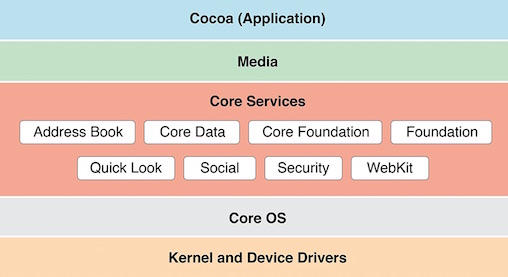
An example of the Apple software stack
What’s special about Apple is that they own the full stack of the software layer from applications to the specialised hardware. It has huge advantages because they can be optimised vertically across different layers. Many specific optimisations can be performed on their own hardware. That’s why Apple’s application runs smoother despite its hardware spec is not as cutting-edge as the Android flagship phones.
What is the software ecosystem of Android like?
Now let’s look at the mess of the Android software stack. In contrast, Google Android took a very different approach compared to Apple. It wants to support Android applications on all different hardware and devices. Its layers are laid “horizontally” but not vertically-integrated like Apple.
Application layer The variety of target hardware capability drives Google to use virtual machines (Dalvik VM or ART) and just-in-time (JIT) complication to support their applications. Therefore the Android applications you downloaded from the Google Play app store are actually “intermediate” byte codes. When you run your app on your android phones, your Android runtime needs to detect what kind of your hardware is and prepares all the resources it needs. Then they can perform online translation from the intermediate code to the native machine code in a “virtual machine”. The virtual machine is like a “condom” if you know what I am saying.

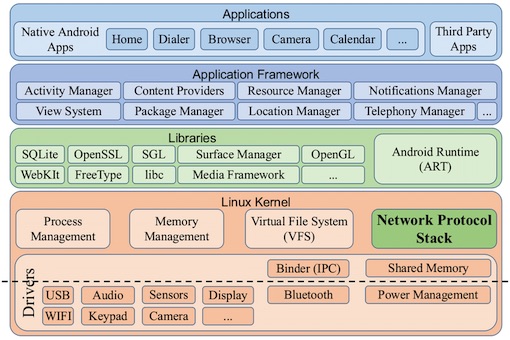
Framework and library layer
Those apps were written according to the APIs provided by the application frameworks defined by Google or third-party libraries graphics and database. These runtime libraries are updated at each patch of the Android OS, such as Android Pie or the next Android Q. 
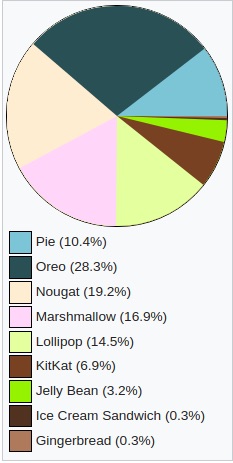
The irony is that only a small proportion of the devices hold the latest version of Android. And what’s worse each update of their runtime API could be only compatible on a small range of Android devices.


Therefore, even if Google stop cooperation with Huawei for the next Android Q release. The latest updates still account for a small fraction of Android devices. And the majority of people don’t care which version they use. And Huawei can still use the legacy version of Android if they are really desperate. Kernel layer
For the bottom layer, the Android runtime and virtual machines need to interact with the operating system or the Linux kernel to access the hardware capabilities such as process, memory, network, and file system management. And these are pretty-much Linux kernels which are open source because they hold GPL licences. So everyone including Huawei can use this service.
What would Huawei do to survive?
After knowing both software stacks from the two biggest software ecosystems from Apple and Google, what would Huawei do to survive? I mean, to survive, not meant to beat Google. This is really not what Huawei wanted. And Google, alleged to be an international company with a motto called “Don’t do evil”, snapped the finger to kill a company who does nothing wrong. Yes, they can follow US laws. But their actions should stay within the US not internationally. Compared to the ban in the semiconductor supply chains, building a full software stack is not a difficult job technically for any big company. The main problem for Huawei is how to attract and sustain its software ecosystem and its user base.
Let’s have a look at what Huawei has done so far.
A three-year preparation
Huawei software engineers have been actively committed upstream many patches to the Android open-source projects. They are already widely applied in the whole Google ecosystem. But the most advanced patches are firstly applied within the EMUI custom Android OS
Here are some examples showing how Huawei can get ahead of Google in terms of software development.
Example 1:
The Flash-friendly File System (F2FS) was firstly developed by Huawei and it was integrated into the EMUI 5.0 system and its Mate 9 phones. After the patches, those Android applications on EMUI no longer lagging. The lagging was mostly due to the latency in flash systems and they optimised away. Later they are applied to other Google Android kernels.
Example 2:
Huawei proposed GPU Turbo framework and applied to use on its mobile phones. The framework can further accelerate gaming performance on EMUI phones. Their performance seems to beat Samsung and Google Pixel.
EMUI 9's GPU Turbo 3.0 now supports Fortnite, Minecraft, 17 more games
Example 3:
In April 2019, Huawei announced their first “all stack” java compiler ——The Noah Ark Compiler. This compiler can statically compile java programs into native arm binaries. And the application binaries can only run on Huawei devices. They finally remove the “condom”, if you know what I am saying.
To support the Ark Compiler and static java programs, Huawei has to rewrite all the framework layers and runtime libraries. It seems Huawei engineers have already completed this task and they will be released on EMUI 9.1. That means they have no dependence on Google frameworks.
Since it is an ahead-of-time compiler, the compiled applications are highly optimised on Huawei phones. The Ark compiler improved system runtime performance by 24%, response time by 44% and third-party application performance by 60% compared to standard Android applications from Google.
Now you might already be aware that what Huawei has been secretly doing for years. Why is it called “Noah Ark Compiler”? Don’t you know the meaning behind it?
A fully-fledged Huawei mobile OS under your nose
Over the past three years (2016–2019), Huawei has been secretly replacing Android components and framework one by one on all the phones who use EMUI. If you are using a Huawei phone reading this post, I would tell you that your phone is becoming less and less Android.
For example, if you are reading this post from the Quora app. On Pixel phones, it might use libraries and frameworks that are provided by Google. But if you are reading it from Huawei’s phone in EMUI, the same Quora app is linked to libraries that are provided by Huawei’s implementation. And you won’t notice the difference. And it is perfectly legal.
Yes, EMUI is no longer a mere Android custom theme now, they will grow into a fully fledged operating system under your nose.

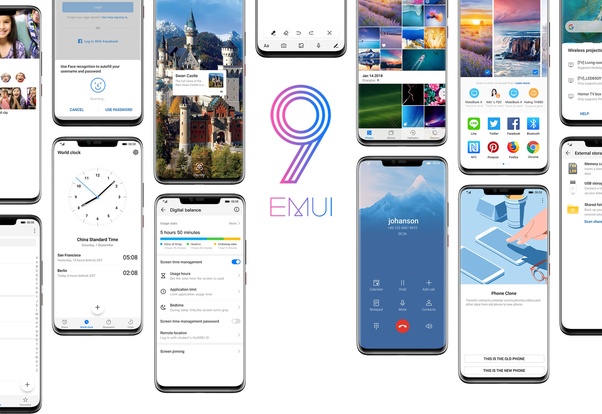
Now a large proportion of Huawei, Xiaomi, Vivo, Oppo, OnePlus phones use the EMUI interface. As all the Chinese phones use the same OS with an estimated 780 million users, they are large enough to support a custom OS and drive Chinese developers to develop an ecosystem completely without Google.
And the OS would continue to develop and “forked” from Google’s master repository. This new forked OS would represent the collective standard of the Chinese software ecosystem and continue to spark more innovations.
All these preparations are done by those Chinese software engineers who spent 9 am to 9 pm six days per week working styles (996). For the past three years, they have been working so hard to fill the gaps. We should never underestimate their efforts.
Perhaps later on Huawei would rename EMUI Operating System into its proper name “HongMeng” 鸿蒙 later sometime. Hong Meng is a character in the Daoist text Zhuangzi and a metaphor for the "primordial world, primaeval chaos" in Chinese creation myths.
Now just imagine a parallel universe where China naively allows Google and Facebook services into the Chinese market since 2012. The Chinese software ecosystem would have been already slaughtered by the USA now.
Can Huawei still survive in the overseas market?
So from the above section, we know that Huawei can defend itself well in the Chinese market with zero Google influence. How about the overseas market? In 2018, there are around 46% of Huawei phones sold outside China and all their customers need Google services, otherwise, they would leave Huawei.
Yes, the overseas market is still very important for Huawei. But note that for the extreme case when Huawei loses all its overseas market, it can still survive by purely relying on the Chinese market.
Solution 1: Use other country’s laws
Huawei can make use of each country’s anti-monopoly law to restrict Google. We all know that the EU is so pissed off by Google. Since 2010, the European Union has launched three separate antitrust investigations into Google for violating the EU's competition laws due to its dominant position in the market. Google has been found guilty of antitrust behaviour in cases related to Google Shopping and Android and has been fined over €6 billion.
After the ruling, Google is required not to bind Google services on any android phones. Users in the EU have their own choice to install Google services. And this creates an opportunity for Huawei to use its legal weapons and sue Google if Google attempts to forbid Huawei to use Google services on the EMUI OS. This applies to other parts of the world, especially India.
Solution 2: Add India into the equation
Another possible solution is to outsource all its software stack to Indian partners. Let an Indian company design, customise and package EMUI services on Huawei hardware. Invest in an Indian company who design a customised EMUI specifically for Indian users.
Just like the UC Browser in India, why do Indian people chose to use UC browser over Chrome browser? And Huawei can use the same strategy to bind EMUI and let an Indian company do the job. Now if Google forbids this Indian company to use Google services on Huawei platform, Huawei can use its legal weapons to sue Google in India as well. It is not the USA anyway. India has its right to protect its domestic company for its made-in-India initiative.
Solution 3: Bridging
After resolving the right to use Google services in India and Europe, Huawei gains the legal right to use Google services. It can use a similar strategy in other parts of the world. Then it is pretty easy for Huawei to resolving the technical problems of bringing Huawei services and Google services.
No Google Play Stores? That’s fine. Use Huawei stores. Please note that the Google Play store is just a collection of apps. Huawei can provide a similar store by mirroring and recompiling all the apps in Google Play stores. Note that this is perfectly legal for most of the countries. Because the ownership rights belong to the third party developers but not Google.


Especially for those users in developing countries, from my observation, most of them use cheap Chinese phones using the EMUI OS. And they don’t bother to root the device to change to typical Android distributions provided by Google. And the mobile phone market is not about flagship phones, but more cheap and affordable phones.
That means as long as Huawei can lower the price and let the customers stick to EMUI, Huawei can survive and thrive in the software ecosystem in the overseas market. And if Google complains about it. Then amass a group of lawyers and sue it back. In developing countries, China gets even better-positioned thanks to the connections built by the Chinese government.
Again it is a golden opportunity for Huawei. And Huawei really needs its legal division to fight on all parts of the world except the US.
The world is not just about the 1 billion developed English-speaking countries. It is much wider, how about the rest 6 billion people out there?
-
The Ark compiler improved system runtime performance by 24%, response time by 44% and third-party application performance by 60% compared to standard Android applications from Google.
Surprise :-) And Google and all the time told how nice is to have JIT compiler, how it is better than static.
-
New developments
ARM instructed employees to halt "all active contracts, support entitlements, and any pending engagements” with Huawei and its subsidiaries to comply with a recent US trade clampdown.
Trump also managed to end ARM domination in few days, as no one now will rely on them and their licenses. As it can be pulled any minute. Moves won't be fast but we will see independent ARM based CPUs and LSI as well as move to other architectures.
-
While few, at least those who have worked in the telecom and mobile industry, would doubt Huawei's abilities to come up with a technical solution addressing the embargo in late 2019 and beyond, consumer and operators' perceptions must be addressed, at a minimum in foreign markets where they have double digits share . Perception, even if it is incorrect, is always the driving factor short term and one rarely can change it down the line. I agree that if Chinese vendors (or Samsung) can gain a majority share in India and ASEAN, then it is essentially game over (that is half of the world's population). In those 3 regions (as well as in Latin and South Americas), the smartphone market is by en large low end. Like fashion, many may look at high end fashion catwalks, but it is the cheap pret-a-porter that we open our wallets for. A key factor will always be localization of the UI and apps. The irony on this 5G blow up is both Ericsson and Nokia (the other 2 alternatives on 5G infrastructure to Huawei) also manufacture their base stations as well as other network equipment, including quite a lot of R&D, in China for decades, even before 1989. Cisco is always strong on core router networks where it is the top vendor in my mind, but it is not an end to end 3G/LTE/5G network supplier.
-
LOL
You know that instead of Huawei who did not get ANY proved data from their phones Google gets almost everything going to their servers for permanent storage and NSA viewing. And this one is proven countless times.
-
Panasonic joined the party
Japan's Panasonic said it was halting business with Huawei to comply with US restrictions.
Panasonic said the ban applies to goods having 25% or more of US-originated materials, according to reports.
"Panasonic announced in [an] internal notification that it should suspend transactions with Huawei and its 68 affiliates that were banned by the US government," the firm said in a statement
Actually that we observe is that we do not have much independent countries :-) One of explanation of temporary capitalist piece that we had. Sadly US do not understand that they just made fatal mistake that will destoy this carefully build system.
-
Google’s true origin partly lies in CIA and NSA research grants for mass surveillance
The research by Brin and Page under these grants became the heart of Google: people using search functions to find precisely what they wanted inside a very large data set. The intelligence community, however, saw a slightly different benefit in their research: Could the network be organized so efficiently that individual users could be uniquely identified and tracked?This process is perfectly suited for the purposes of counter-terrorism and homeland security efforts: Human beings and like-minded groups who might pose a threat to national security can be uniquely identified online before they do harm. This explains why the intelligence community found Brin’s and Page’s research efforts so appealing; prior to this time, the CIA largely used human intelligence efforts in the field to identify people and groups that might pose threats. The ability to track them virtually (in conjunction with efforts in the field) would change everything.The motive for the war undertaken by Washington against Huawei is deep-rooted and spurious are the justifications.The heart of the problem is that the Chinese firm uses a system of encryption that prevents the NSA from intercepting its communications. A number of governments and secret services in the non-Western world have begun to equip themselves exclusively with Huawei materials, and are doing so to protect the confidentiality of their communications.The covers/excuses for this war are theft of intellectual property or in the alternative, trade with Iran and North Korea, and violating rules of competition by benefitting from national subsidies. -
Japan’s Panasonic on Thursday released a statement on its China website claiming it continues to supply Huawei as normal. It followed an earlier statement from the company saying it had stopped shipments of certain components to Huawei.“Currently Panasonic Corp is still supplying for Huawei. The reports from online media about being out of stock are simply untrue,” the statement said.““Huawei has always been an important partner with Panasonic Corp. We will continue to sell commodities and provide service to our Chinese clients like Huawei, according to the law and regulations of the country and region which Panasonic Corp is located. By helping China, we will help our business grow in China too.”Huawei also released a statement thanking Panasonic for its “consistent support”.“Panasonic is an important partner of Huawei and the two sides work closely together in various fields,” it said. “All business cooperation between Panasonic and Huawei remains in continuous and normal progress. Thanks to Panasonic for its consistent support to Huawei.“At the same time, we would like to thank all the global supplier partners who have supported Huawei’s business development over the long time.”
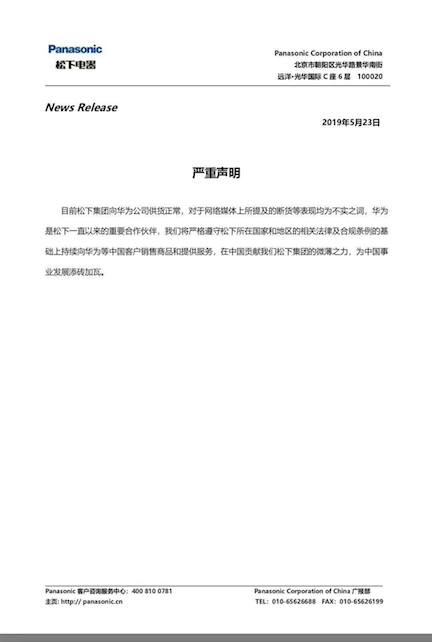
-
Japan's Toshiba said Thursday it has suspended shipments of electronic devices to Huawei Technologies.
Nice.
Can also expect strange events at HDD markets last 6-8 months.
Largest Chinese companies had been moving fast to SSDs for all their notebooks.
Also explains why NAND price started to fall so fast.
-
Google warns of US national security risks from Huawei ban
Tech group pushing Trump officials to exempt its Android operating system from measure
“Google has been arguing that by stopping it from dealing with Huawei, the US risks creating two kinds of Android operating system: the genuine version and a hybrid one. The hybrid one is likely to have more bugs in it than the Google one, and so could put Huawei phones more at risk of being hacked, not least by China.”In the past few weeks, senior Google executives have approached the commerce department asking either for another extension or to be exempted from the ban altogether, according to those briefed on the conversations. In doing so, it has joined groups representing major US microchip makers such as Qualcomm, who are also worried about the impact the ban will have on their business.
Howdy, Stranger!
It looks like you're new here. If you want to get involved, click one of these buttons!
Categories
- Topics List23,998
- Blog5,725
- General and News1,360
- Hacks and Patches1,153
- ↳ Top Settings33
- ↳ Beginners256
- ↳ Archives402
- ↳ Hacks News and Development56
- Cameras2,367
- ↳ Panasonic995
- ↳ Canon118
- ↳ Sony156
- ↳ Nikon96
- ↳ Pentax and Samsung70
- ↳ Olympus and Fujifilm101
- ↳ Compacts and Camcorders300
- ↳ Smartphones for video97
- ↳ Pro Video Cameras191
- ↳ BlackMagic and other raw cameras116
- Skill1,960
- ↳ Business and distribution66
- ↳ Preparation, scripts and legal38
- ↳ Art149
- ↳ Import, Convert, Exporting291
- ↳ Editors191
- ↳ Effects and stunts115
- ↳ Color grading197
- ↳ Sound and Music280
- ↳ Lighting96
- ↳ Software and storage tips266
- Gear5,420
- ↳ Filters, Adapters, Matte boxes344
- ↳ Lenses1,582
- ↳ Follow focus and gears93
- ↳ Sound499
- ↳ Lighting gear314
- ↳ Camera movement230
- ↳ Gimbals and copters302
- ↳ Rigs and related stuff273
- ↳ Power solutions83
- ↳ Monitors and viewfinders340
- ↳ Tripods and fluid heads139
- ↳ Storage286
- ↳ Computers and studio gear560
- ↳ VR and 3D248
- Showcase1,859
- Marketplace2,834
- Offtopic1,320






